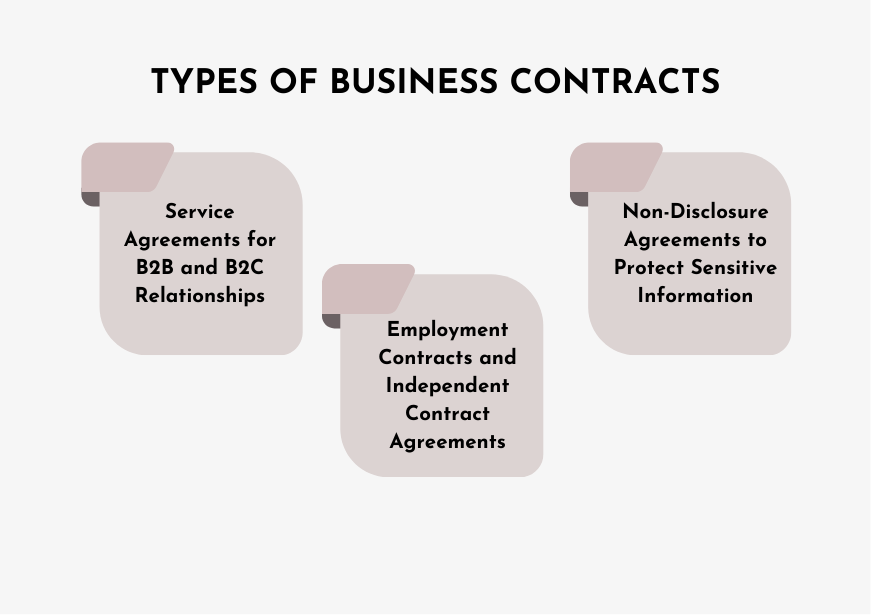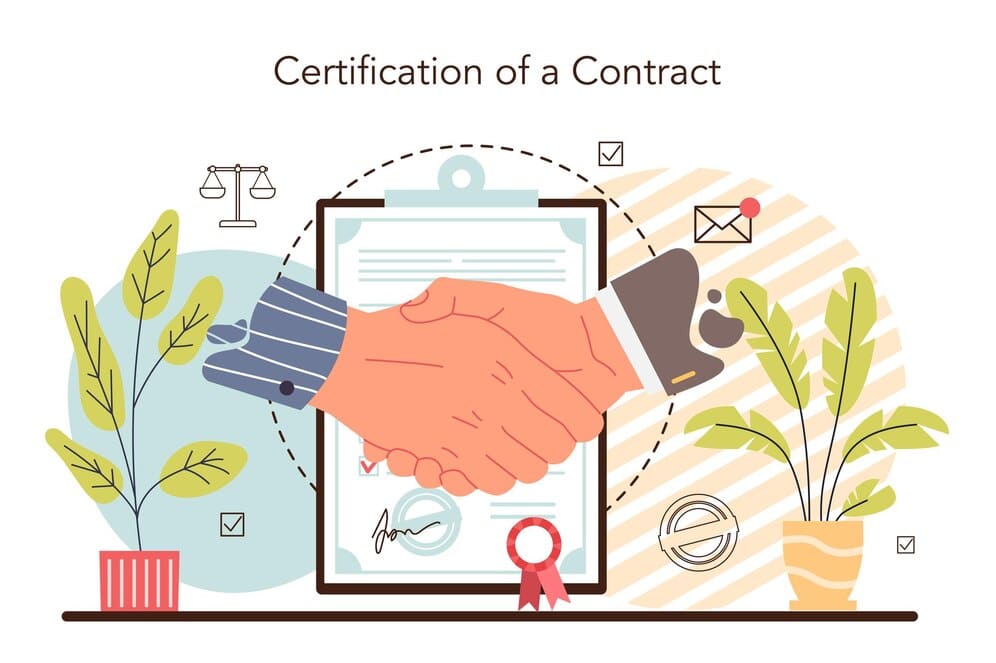Business agreements or contracts are the backbone of any successful business relationship. They serve as legally binding documents that outline the rights, responsibilities, and expectations of all parties involved. Whether you’re a small business owner or part of a large enterprise, understanding these agreements is essential to managing risks and ensuring smooth operations. From service agreements to non-disclosure pacts, each contract type serves a unique purpose in safeguarding your business interests.
This blog will guide you through the fundamentals of business contracts, the difference between contracts and agreements, and the importance of having clear, written terms. We’ll also explore verbal vs. written contracts, the key elements that make an agreement legally binding. Whether you’re new to contracts or looking to fine-tune your approach, this guide will help you navigate the complexities of business agreements with confidence.
Understanding the Fundamentals of Business Agreements

Business agreements play a key role in making business dealings successful. They are AI legal documents that outline the rights and responsibilities of all parties involved. These agreements are more than just paperwork. They help clarify expectations, lower risks, and provide a solution for any problems that may arise.
Effectively managing business agreements is key for companies of all sizes. These agreements create clear expectations and provide legal options if there are misunderstandings or problems. This practice helps to enhance business operations and lower the risk of financial losses and damage to the company’s image.
The Difference Between Contracts and Agreements
An “agreement” and a “contract” are terms that people often mix up. However, they mean different things in law. An agreement is a general understanding between two or more people. This understanding may not always have legal force. A legal agreements is a type of agreement that follows certain legal guidelines. This makes it enforceable by law.
The main difference is how the law treats them. A contract makes promises that the law supports. If someone fails to keep an agreement, there are legal steps to solve the issue. Businesses need to understand this difference. It helps them ensure their agreements are strong and provide good protection.
Verbal vs. Written Contracts: Implications for Your Business
Verbal agreements might be legal in some cases. However, they are difficult to prove and enforce. A written agreement provides clear proof of what everyone agreed on. This helps reduce confusion and arguments.
Having a written operating agreement is a wise choice for businesses. This is especially important for complex deals or high-value transactions. Even simple agreements, like those with independent contractors, should be in writing. A written agreement helps to clarify terms and avoid future legal issues. Remember that state law can vary, so it’s best to consult a business lawyer.
Related Article: How to Simplify Contract Review with AI? Comprehensive Guide
Essential Elements of a Legally Binding Contract

A good contract is important for securing business deals. It must have several key elements to be valid. When these elements are clear and included, the contract can be enforced. This protects the rights and interests of everyone involved.
An agreement can be tough to enforce if it does not have important parts. This can confuse both sides. It might lead to breaking the agreement or legal issues.
Identifying the Parties Involved Accurately
A key part of any contract is to name the people involved. You need to list individuals, companies, or other legal groups clearly. It is also important to include their full legal names and addresses. This step is very important.
In a real estate deal, it is important to name the buyer and the seller. This is also true for a partnership agreement. You should list all the partners along with their roles. If you do not identify everyone properly, it can lead to confusion, delays, or even legal issues.
Clearly Defining the Scope and Terms of the Business Contracts and Agreement
Ambiguity can damage a good contract. It is vital to clearly explain the scope of work, payment terms, and deadlines. This clarity helps to avoid issues. You also need to be specific about:
Business Contracts and Agreements
- Scope of work: A clear description of the goods or services that will be supplied.
- Payment terms: A timetable for payment that everyone agrees to, which includes how payments will be made and penalties for any late payments.
- Deadlines: Clear timelines for when tasks or services need to be finished.
A clear service agreement will explain these details well. It will help avoid any misunderstandings. This way, both sides will see things in the same way.
The Importance of Consent and Consideration
A contract happens when everyone agrees to it. This means that all parties must join willingly and know what the terms are. This is known as “consent.” There must also be “consideration.” This means each side must give something valuable. This could be goods, services, or money.
These legal requirements help ensure the agreement is fair and voluntary. For example, if a contract lacks consideration, it means one person benefits without returning anything. This could make the contract difficult to enforce. By making sure that consent and consideration are included in the agreement, we support its fairness and validity.
Related Article: What is a Franchise Agreement? A Complete Guide
Types of Business Contracts and Their Uses

The business world has many kinds of contracts. Each contract is created carefully to fit certain needs and situations. There are service agreements and non-disclosure agreements, to name a few. Choosing the right type of contract is very important. It helps make clear what is expected and lowers risks.
Knowing the differences between these types of contracts makes businesses feel secure. They can make deals with trust. They know that their interests are legally protected.
Service Agreements for B2B and B2C Relationships
Service agreements are very important for business relationships. This is true for both business-to-business (B2B) and business-to-consumer (B2C) settings. These agreements explain the services that will be provided. They also detail the payment terms and what is expected in terms of performance.
A marketing agency can use a service agreement when they work with a client. A software developer may also use it for routine maintenance of a client’s app. This clear agreement helps to prevent conflicts. It makes sure that both sides do what they agreed to do.
Non-Disclosure Agreements to Protect Sensitive Information
In today’s world, it is important to keep confidential information safe. A good way to do this is through non-disclosure agreements, also called NDAs. These are legal tools. They prevent people from sharing sensitive information they learn while working together.
This sensitive information can be things like trade secrets, financial details, or special technology. Companies often use NDAs to keep this information private. They do this when talking to investors, working on joint projects, or when employees deal with important business data. NDAs help businesses protect their intellectual property and maintain a strong position in the market.
Employment Contracts and Independent Contract Agreements
When a business hires people, it must know the difference between employees and independent contractors. Each kind of job needs a different contract. Employment agreements explain the relationship between the employer and the employee. These agreements include important details like salary, benefits, job duties, and what happens if the job ends.
Independent contractor agreements are used for hiring people for specific projects or tasks. This does not create a regular job relationship. If someone is classified incorrectly, it can lead to legal issues and expenses. This highlights the importance of choosing the right types of business contracts for your staffing needs.
Related Article: What is Business Associate Agreement (BAA)? Detailed Guide
Steps to Create a Personalized Business Agreement

Creating a business contract that suits your needs is very important. While templates are helpful and easy to find, a custom contract gives you what you really need. You should figure out what you want. Then, pick the right clauses. Lastly, make sure it meets legal standards.
A good contract that is tailored just for you cuts down on risks. It keeps your interests safe and provides a clear path for a successful business relationship.
Determining the Need for a Custom Contract
Standard contracts can be good for many deals. But some business operations need a unique approach. To know if you need a custom contract, you should check how complex the deal is and what risks might arise.
A small business that works with a bigger company on a special project might need a custom contract. This contract should explain the rights to intellectual property. It should also outline how the profits will be shared. These special agreements help keep things clear. They also address specific issues that regular contracts might overlook.
Drafting the Contract: Key Sections and Clauses to Include
- A clear purpose
- Details about the parties involved
- A timeline for the agreement
- Payment terms
- Responsibilities of each party
- A way to resolve disputes
- Any special conditions that apply
- Contract template: A simple template helps you save time and ensures all important parts are included.
- Confidentiality clause: This keeps sensitive business information safe.
- Payment terms: It outlines when payments are due, how to pay, and what happens if a payment is late.
- Intellectual property rights: This mentions who owns and can use creative work or inventions.
- Termination clause: This explains how to end the agreement and the conditions for doing so.
Carefully changing these parts makes the contract show the agreement clearly. It also lowers risks that come with the deal.
Legal Review and Avoiding Common Pitfalls
It is important to get help from a good business lawyer before you finish a contract. A legal check helps ensure the contract meets all the laws and rules needed. This can lower the chances of having legal problems later.
A lawyer can find problems like unclear terms, unfair conditions, or things that are missing. These issues can make it hard to enforce the agreement. Asking a legal expert for help when creating the contract can save you time and money. This can also stop legal troubles in the future.
Related Article: What is an Enterprise License Agreement (ELA)?
Navigating Standardized Contracts

Standard contracts are often used in many similar deals. They help manage business agreements more easily. It is essential to understand the good and bad sides of these contracts. This knowledge helps you decide better on when to use them.
Balancing efficiency and protecting the law is important. It helps us get the most from using standards. This way, we can manage potential risks better.
Advantages of Using Standard Contracts
Standard contracts are commonly used for commercial leases and sales contracts. They offer several benefits. Since these contracts have specific terms and are widely used, they often help reduce legal costs. They can also make the negotiation process faster.
For businesses that often do similar deals, using standard contracts is helpful. It reduces extra work and keeps things steady. This is great, especially for startups and small companies that may not have a lot of resources.
When to Opt for Standardization vs. Personalization
Choosing between a standard contract and a personal one depends on your situation. For simple deals, a business contract template could work well. However, if the deal is more complicated, you may need a customized agreement that fits your specific needs.
Personalization works well for special situations, important deals, or contracts that could lead to arguments. In contrast, standardization is better for making things more efficient. It saves money and makes regular transactions feel easier and less risky.
Related Article: 10 Key Challenges to in a Merger: An Effective Guide
Dispute Resolution and Termination of Contracts

Even with great contracts, disagreements can still occur. It’s important to learn how to fix problems and how to end agreements. This understanding helps us handle these situations better.
A clear way to solve conflicts can help reduce problems in business operations. It can also keep good relationships, even when there is disagreement.
Effective Strategies for Resolving Contract Disputes
Contract disputes can become costly legal battles if they are not handled fast and correctly. You may need to hire a lawyer sometimes, but there are other options. Mediation and arbitration can often provide quicker and cheaper ways to solve disputes.
Mediation is when a neutral person helps two people talk through their issues. They try to find a solution both people can agree on. In contrast, arbitration involves a neutral person who decides what will happen. Both parties must follow this decision, which is based on their contract and the law. Choosing the best way to resolve a conflict depends on the issue at hand and how ready both people are to negotiate.
Ending Contracts Amicably: Mutual Agreements and Obligations
Some contracts have fixed end dates. However, some may need to end due to unexpected situations or changes in business needs. When you end a contract, it is important to do it professionally. You should always follow the rules that are outlined in the agreement.
Many contracts include termination clauses. These clauses describe how to end the contract and the conditions for doing so. Sometimes, both sides can agree to break the contract together. This agreement will also outline any last duties they may need to fulfill.
|
Termination Scenario |
Description |
Obligations |
|
Breach of Contract |
One party fails to fulfill its contractual obligations. |
The breaching party may be liable for damages. |
|
Mutual Agreement |
Both parties agree to end the contract. |
Outlined in a termination agreement, often involving a release of further obligations. |
|
Force Majeure |
Unforeseen events, like natural disasters, render the contract impossible to perform. |
Contract may be terminated, and parties may be released from obligations. |
Knowing how to end a process and what steps to take can lower the risk of legal issues. This way, it also helps everyone involved to handle the change easily.
Related Article: What is Channel Partner Agreement? A Comprehensive Guide
Conclusion
In conclusion, managing business agreements is very important for a successful business. You need to know the basics and the main parts of legally binding contracts. It’s also good to understand the different types of business contracts. Making sure contracts fit your needs is key. Using tools like Volody can help manage contracts better and keep you following the rules. It’s also essential to have good ways to solve disputes and to end contracts without issues. This shows that clear and simple agreements are important in business. Remember, small businesses can benefit from fair and good contracts. Use these tips to protect your business and build strong work relationships.
FAQs
What makes a Business Agreement Legally Enforceable?
A legally binding agreement requires several important parts. First, both sides need to agree to it. Second, there must be something of value exchanged between them. Third, the people involved must be capable, which means they need to be of legal age and able to make decisions. Finally, the reason for the agreement must be legal.
Can a verbal Agreement serve as a Legal contract?
A spoken agreement can sometimes count as a legal contract. But proving it can be tricky. A written contract is clearer. It can be enforced more easily, especially if state law says it needs to be written.
How can small businesses avoid unfair contract terms?
Small businesses can stop unfair contract terms by following some steps. They should get legal advice. It is key to review every clause closely. Businesses should also talk about the terms. Lastly, they need to understand the entire agreement before signing it.
What is the Role of Contract Lifecycle Management in Business Agreements?
Contract lifecycle management helps make things easier and ensures rules are followed during a contract’s lifetime. This starts from the creation of the contract and continues until it is finished. It helps businesses run their processes better and manage risks effectively.





